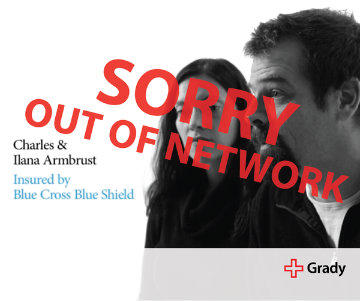
Section Branding
Header Content
Grady Hospital Takes Fight With BlueCross To The Public
Primary Content

Atlanta’s Grady Memorial Hospital is locked in a bitter dispute with the state’s largest health insurance company. Grady’s agreement with BlueCross BlueShield of Georgia expired last month. That means the hospital is now outside of BlueCross’ network. Last week, the hospital released documents, saying that BlueCross pays Grady as much as 70 percent less than other medical centers in Georgia. Grady is also waging a public relations campaign, on air and online.
The ads are designed to grab your attention. A man and his wife, filmed in black and white, behind a stark white background.
The man breaks down as he recounts how he suffered a brain aneurysm and how doctors at Grady Hospital saved his life. “Two hours later, I’m having brain surgery. I had to tell my wife goodbye, just in case," he says.
The ad says the man has BlueCross insurance, but the hospital is no longer in the insurer’s network. It closes with this text on the screen: “BlueCross BlueShield abandoned its responsibility to pay Grady fairly. Shame on you, BlueCross.”
Healthcare marketing, by nature, is risk-averse, says Bill Balderaz. He’s president of Fathom Healthcare, a healthcare marketing firm in Columbus, Ohio. “It's about happiness and well-being and, you know, happy moms with new babies and the boomer with the new knee," he says.
Lindsay Caufield, Grady’s Vice President of Public Affairs and Marketing, says the message is supposed to be direct. She says the ads are meant to remind Atlantans of Grady’s importance to the community and galvanize support for its fight against BlueCross."I think that this is only one other way that we can kind of come together and have those voices that help us say, you know,we want to reach a fair resolution,” she says.
Caufield wouldn't say how much Grady is spending on the campaign. In addition to TV, it includes full-page advertisements in the Atlanta Journal-Constitution, Wall Street Journal and USA Today. There’s also a social media component, with the hashtag “befair2grady”.
BlueCross has decided not to respond with ads of its own. “We don’t believe it’s productive or informative. Our hope is that Grady will choose to come back to the negotiating table so that we can reach an agreement on fair and sustainable contract terms ...Our focus is on the negotiations and productive two-way communication, not buying ads to disparage the other side,” company spokesman Tony Felts said in an email.
Across the US, hospitals are under more pressure to control costs. Insurers, meanwhile, face more scrutiny on what they’re willing to pay health providers.
"The tension on both sides has been amped up over the last three or four years. So it doesn't surprise me that we see some of this blowing up in terms of the confrontation," says Larry Van Horn, an associate professor of health policy at Vanderbilt University.
That could mean more public fights, like the one playing out in Atlanta. Bill Balderaz, who runs the healthcare marketing company in Ohio, says his industry is eager to see how it’s resolved.
“These negotiations are happening in every city and between every system and every insurer,” he says. “The fact that someone had taken this first step to make more of a public war in the court of public opinion...we're all watching this."
In the meantime, Grady Hospital and BlueCross BlueShield say they respect one another and their dialogue is ongoing.
Tags: Bradley George, Grady Hospital, BlueCross BlueShield
